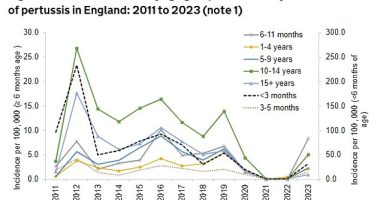A jab made with two anti-obesity medicines rather than one could be better than Ozempic for weight loss.
The experimental treatment contains two drugs that target different areas of the brain to curb appetite. In tests on mice, the combined therapy doubled the amount of weight some lost compared with using Ozempic on its own. The jab also appears to prompt lasting changes in the brain so that appetite remains reduced once treatment has stopped.
This is one of the drawbacks with the blockbuster slimming drugs such as Ozempic and Wegovy (which contain different doses of the active drug semaglutide). These work by mimicking the effects of a hormone called glucagon-like peptide-1 (GLP-1), which is released by the gut after we eat to send a message to the brain that we are full.
The drugs activate GLP-1 receptors in the brain, so it registers fullness in the stomach after minimal amounts of food.
As a result, most people feel full after a few mouthfuls. But the drugs only work if you keep taking them, which means some patients could end up on them for life.


The experimental treatment contains two drugs that target different areas of the brain to curb appetite


In a new approach, scientists at the University of Copenhagen in Denmark fused semaglutide with a drug called dizocilpine
Britain has the highest obesity rates in Western Europe. Almost 26 per cent of adults in England were classed as obese – with a body mass index of 30 or above – according to the Health Survey for England 2021.
In a new approach, scientists at the University of Copenhagen in Denmark fused semaglutide with a drug called dizocilpine, which was developed more than 40 years ago to treat seizures caused by conditions such as epilepsy.
Studies found it was also an effective appetite suppressant, blocking a receptor in the brain called NMDA. This is the receptor that glutamate, a brain chemical associated with stimulating appetite, usually binds to. By blocking the receptor, the drug prevents this effect.
But dizocilpine never went into mass production because studies showed it caused lesions – or scarring – on the brain and triggered hallucinations.
The Copenhagen team, however, found it was safe and effective when used in much smaller doses than for seizures, and alongside semaglutide in one jab.
Results published in Nature last month showed that mice injected with the two-in-one drug lost twice as much weight than those on semaglutide alone.


Britain has the highest obesity rates in Western Europe. Almost 26 per cent of adults in England were classed as obese – with a body mass index of 30 or above – according to the Health Survey for England 2021 (stock image)


Alex Miras, a clinical professor of medicine at Ulster University and an expert in obesity treatment, said: ‘This is very exciting – it’s a smart combination of two mechanisms that in combination can cause weight loss’
The mice given the combination jab lost 20 per cent of their total body weight in 14 days – compared with around 9 per cent if they were only given semaglutide.
They also carried on eating less when treatment stopped.
It is thought this may be because dizocilpine has been shown to strengthen nerve connections in the brain, so new learned behaviours — such as eating less — become permanent.
The researchers have formed a spin-out company, called Ousia Pharma, to further develop the slimming superdrug over the next few years.
Alex Miras, a clinical professor of medicine at Ulster University and an expert in obesity treatment, said: ‘This is very exciting – it’s a smart combination of two mechanisms that in combination can cause weight loss. But we need to find out if it works as well in humans as it does in mice.’
Source: Mail Online






